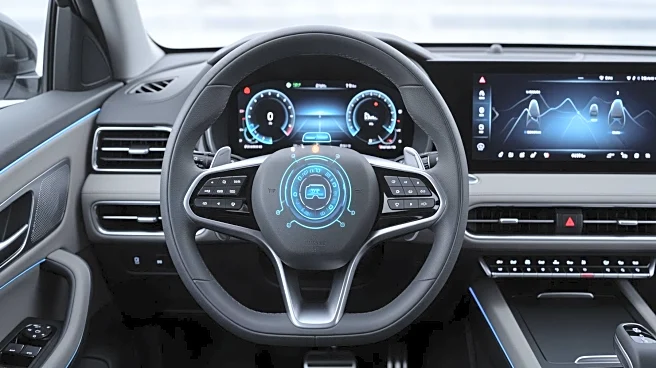What's Happening?
General Motors is advancing its integration of artificial intelligence into its vehicle lineup, aiming to enhance driver experience and vehicle functionality. The automaker plans to introduce conversational AI powered by Google Gemini in its vehicles
next year, allowing drivers to draft messages and plan routes with contextual assistance. This is part of GM's broader strategy to develop custom-built AI tailored to individual vehicle intelligence and driver preferences. Starting in 2026, GM will roll out software updates to OnStar-equipped vehicles, enhancing features such as maintenance alerts and optimized route planning. The company is also preparing to debut 'eyes-off' driving technology in 2028, initially available on the Cadillac Escalade IQ for highway use. This technology builds on GM's existing Super Cruise system, offering a more autonomous driving experience.
Why It's Important?
The integration of AI into GM's vehicles represents a significant shift towards autonomous driving and personalized vehicle experiences. This development could impact the automotive industry by setting new standards for vehicle intelligence and driver assistance technologies. Consumers may benefit from enhanced safety features and convenience, while GM positions itself as a leader in automotive innovation. The introduction of 'eyes-off' driving technology could accelerate the adoption of autonomous vehicles, influencing public policy and infrastructure development. However, it also raises questions about privacy and data security, as AI systems collect and analyze driver data to optimize functionality.
What's Next?
GM's rollout of AI-driven features will likely prompt reactions from competitors and regulatory bodies. As the company prepares to launch its custom-built AI and 'eyes-off' driving technology, stakeholders may scrutinize the safety and ethical implications of these advancements. The automotive industry may see increased investment in AI research and development, as companies strive to keep pace with GM's innovations. Additionally, regulatory frameworks may evolve to address the challenges posed by autonomous driving technologies, ensuring safety and consumer protection.
Beyond the Headlines
The ethical considerations surrounding AI in vehicles are complex, involving data privacy, security, and the potential for algorithmic bias. As GM advances its AI capabilities, it must navigate these issues to maintain consumer trust and comply with legal standards. The long-term impact of AI-driven vehicles could reshape urban planning and transportation systems, as cities adapt to accommodate autonomous vehicles. Cultural shifts may also occur, as society adjusts to new norms in driving and vehicle ownership.
















